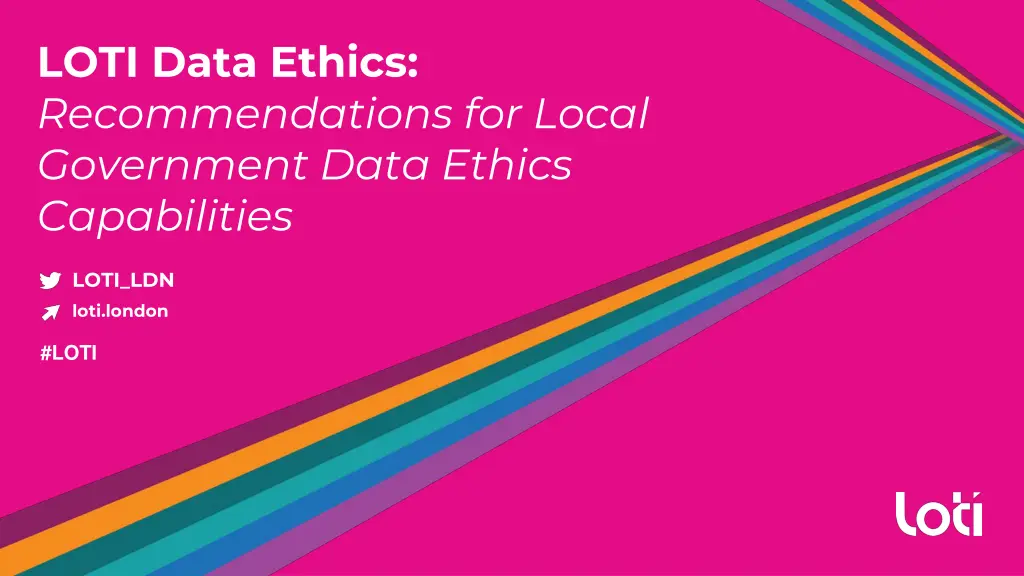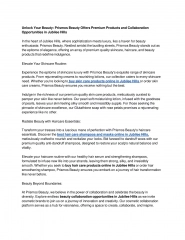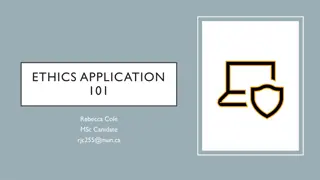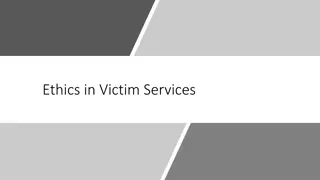
Local Government Data Ethics Recommendations & Principles
Explore LOTI's comprehensive recommendations and principles for enhancing data ethics capabilities in local government. Learn how to formalize data ethics principles, engage residents, develop skills, and foster a culture of ethical data use. Discover key universal principles such as transparency, accountability, privacy, fairness, and safety. Dive into actionable steps and case studies to implement ethical practices effectively.
Download Presentation

Please find below an Image/Link to download the presentation.
The content on the website is provided AS IS for your information and personal use only. It may not be sold, licensed, or shared on other websites without obtaining consent from the author. If you encounter any issues during the download, it is possible that the publisher has removed the file from their server.
You are allowed to download the files provided on this website for personal or commercial use, subject to the condition that they are used lawfully. All files are the property of their respective owners.
The content on the website is provided AS IS for your information and personal use only. It may not be sold, licensed, or shared on other websites without obtaining consent from the author.
E N D
Presentation Transcript
LOTI Data Ethics: Recommendations for Local Government Data Ethics Capabilities LOTI_LDN loti.london #LOTI
How to Use the Recommendations for Local Government Data Ethics Capabilities 2 Local government need to be able to collect, share, analyse and innovate with data in a way that their residents expect of them. Accordingly, LOTI has developed 16 recommendations as a resource for local government to guide how they develop their data ethics capabilities. Data ethics refers to how we should collect, share and use data, and so goes beyond the legal obligations of local government, in particular as defined in the GDPR. Each recommendations comes with specific actions that should inform how a borough or interested organisation might deliver each recommendation. The Recommendations are also listed in a LOTI-suggested ranking that suggests which steps are more appropriate for organisations at different ethical maturity levels. NB: This document is being transformed into a toolkit on the LOTI website for September 2022. More detailed information on each recommendation will accompany that toolkit.
LOTI Recommendations for Local Government Data Ethics Capabilities PRINCIPLES & VALUES 1 - Formalise data ethics principles into a data strategy or policy. 2 - Adopt five universal principles: Transparency; Accountability; Privacy; Fairness; and Safety. Read LOTI Guidance on data ethics principles First steps RESIDENT ENGAGEMENT GOVERNANCE & PROCESSES SKILLS & CULTURE 3 - Share details of data use publicly and in appropriate language. 4 - Proactively inform residents when they are subject to complex data processes. 7 - Create a data ethics process flow for data projects. 8 - Test and implement tools for data ethics projects (identified in the ethics process flow). 9 - Share any ethics impact assessments done of data projects 13 - Invest in data ethics skills training for data professionals, leaders, and service managers. 14 - Develop an ongoing organisational dialogue and culture on ethics. Low Maturity 5 - Engage residents when establishing untested, new or advanced data tools or methods. 10 - Establish a data ethics board. 15 - Include a responsibility for data ethics in data job descriptions. Medium Maturity 6 - Develop data (ethics) literacy of residents. 11 - Create a simple appeal services for residents to challenge data-made decisions. 12 - Ensure suppliers meet data ethics principles and transparency standards.. 16 - Hire a dedicated Data Ethicist. High Maturity
Recommendations: Principles and Values. 4 1. Adopt five key universal principles: Transparency; Accountability; Privacy; Fairness; Safety; Ethics should be guided by value-based principles which reflect the values held by the society in which those decisions are made. LOTI suggest adopting 5 key universal principles: transparency, accountability, privacy, fairness and safety as guiding principles for all decisions made using or about data. They were chosen because they are both extremely relevant for local authorities, and almost universally shared in other principles documents from around the world. To learn more about each individual principle, and what types of commitments they might encompass, LOTI has produced a more detailed guide, which can be accessed here. Organisations can also read about other principles they may want to consider within the document. Recommendation in Practice: Camden Borough created a Data Charter with their residents, which contains all of the above principles.
Recommendations: Principles and Values. 5 2. Incorporate data ethics into a formal policy or data strategy that directly inform decisions and hold teams to account. The ethical principles that shape an organisation should be formalised and incorporated into a policy document within that organisation. In particular, LOTI suggest them being part of a data strategy, giving ethics its appropriate importance in how an organisation uses data. The principles suggested in Recommendation 1 are in line with international good practice, plus expectation of London s residents, as tested by Camden. Therefore, LOTI believes that boroughs can confidently adopt these principles into policy without further engagement. LOTI recommends that the policies be designed to be as practical as possible, for example associating organisational deliverables with principles, to move from principles to action. Recommendation in Practice: Camden s Data Charter includes a set of commitments that the Council promises to deliver with different time frames, which are informed by the 7 principles of the Data Charter.
Recommendations: Resident Engagement. 6 3. Share details of data use publicly and in appropriate language. LOTI recommends that local authorities should follow the communication principles set out in the UK Algorithmic Transparency Standard, which details two levels of communication necessary to ensure appropriate transparency for a given project: Tier One: Active, up-front communication to those most affected, with a high-level plain language description of the data use. Tier Two: Passively available, more detailed and technical information available to access for anyone interested, including residents but also researchers or journalists. Recommendation in Practice: As part of Camden s Data Charter, they produced case studies of how they were using data to be communicated to non-expert citizens with the help of the Alan Turing Institute. The South London Partnership has a map of active public realm sensors, with location and purpose of sensors clearly communicated for interested readers.
Recommendations: Resident Engagement. 7 4. Proactively inform residents when they are subject to complex data processes, such as automated decisions, AI-powered robots or surveillance technologies. Whilst organisations have legal responsibilities for communicating certain types of data decisions or methods of data collection, there are ethical design considerations which extend beyond the legal obligations contained within documents like the GDPR. Fundamentally, these are often design considerations - how and when you communicate specific bits of information with residents. Below are a list of specific examples where LOTI believe councils should more proactively communicate with residents about how decisions are being made with data. Automated Decisions - For example, there is a legal obligation to tell a data subject if an automated decision is made about them. However, LOTI recommends that local authorities proactively tell data subjects in advance of such a decision even being made, that the decision will be done with an automated manner. Recommendation in Practice: The Central Digital and Data Office (CDDO) state that for AI-powered chatbots on the gov.uk website, it s best to make it clear the user is not talking to a real person.
Recommendations: Resident Engagement. 8 5. Engage residents to establish guidance or policy around their values and expectations for new, more advanced, untested or publicly divisive data uses. Engaging residents in deliberative or consultative processes is helpful for understanding how residents actually feel about particular data uses. These opinions and values should shape how a borough ethically approaches their data use. These processes can vary immensely, depending on the need and resources of the organisation. However, there is useful guidance to help councils understand what is possible. The Alan Turing Institute have produced useful guidance here which LOTI recommends to boroughs. It includes both a description of when to engage residents in the timeline of a project (in summary: the design stage is best, but whenever is good!), and a guide on engagement methods which LOTI recommends as a useful resource explaining the different types of options available, and their relative strengths to each other. Recommendation in Practice: In Portland, Oregon (US), the city administration is consulted its residents to inform the creation of a policy on surveillance technologies, which can be read about here.
Recommendations: Resident Engagement. 9 6. Develop data (ethics) literacy of residents To truly be accountable, those fundamentally holding councils in a democracy to account, their residents, need to understand data issues sufficiently to understand council data decisions in the appropriate context. As such, LOTI believes that the most mature organisations will proactively seek to educate their own residents on data issues, including, but not necessarily limited to: - How councils use data; - What their legal rights as a resident around data are; - Technologies where there are particular ethical dilemmas; - How councils mitigate ethical risks; To do this, LOTI recommends Information Governance (IG) officers, data officers, and resident engagement and communication officers develop public campaigns around data. Recommendation in Practice: The Alan Turing Institute created a Citizen s Guide to Data to help educate residents in Camden s citizen jury understand the social, legal and ethical issues around data.
Recommendations: Governance & Processes. 10 7. Create a data ethics process flow for data projects. Data project managers will need to be aware and making appropriate risk-mitigating decisions about ethical risks throughout the lifecycle of a project, including the design and testing stages, and the implementation and the evaluation. Importantly, there should also be internal accountability at a managerial level to ensure that ethical checks are consistently being taken and evaluated. To map out these important processes, LOTI recommends creating a data ethics process flow for data projects. This can help an organisation map what checks are happening at each stage of a process, and in doing so, reveal some of the skills and competencies that an organisation may wish to develop (see Recommendation XX: Developing Skills and Culture). Recommendation in Practice: LOTI created a generic Data Ethics Process Flow based on the one created for Brent, which can be accessed here.
Recommendations: Governance & Processes. 11 8. Test and implement the appropriate tools for doing data ethics (identified for the ethics process flow). There are a growing number of tools which can help data projects manage ethical considerations, which can be suitable for different stages of the design process (see Recommendation 7). At the conception and design stage of a project, LOTI recommends using the Open Data Institute s Data Ethics Canvas, or the Government Digital Service s Data Ethics Framework. Impact Assessments are also useful tools, and include Data Privacy Impact Assessments or Human Rights Impact Assessments, as well as recently Algorithmic Impact Assessments (AIAs). Lastly, audits, including technical and regulatory, can evaluate both the data systems themselves and the potential broader consequences of a data project during or after the fact. Recommendation in Practice: Brent s data ethics process flow identified the need for a design stage tool. They use the Open Data Institute Data Ethics Canvas, which can be accessed here.
Recommendations: Governance & Processes. 12 9. Share ethics assessments and evaluations of data projects to develop shared and consistent ethical decision-making. In the spirit of transparency, and to help with shared learning across boroughs by enabling officers to see how other councils evaluated and mitigated certain risks, LOTI recommends that councils publish any assessments or evaluations that they do of data projects. These can include impact assessments (for example, a Data Privacy Impact Assessment (DPIA), Equalities Impact Assessment (EIA) or an Algorithmic Impact Assessments (AIAs) (see this Ada Lovelace report for more information)). However, it might also include Whilst councils might initially have to publish their assessments on their own websites, LOTI proposes developing a central platform for London that might house impact assessments independently. Recommendation in Practice: The UK Algorithmic Transparency Standard plans to publish impact assessments as part of a proposed transparency register, initially on this webpage.
Recommendations: Governance & Processes. 13 10. Establish a Data Ethics Board A data ethics board can be a powerful governance structure for an organisation, advising and shaping individual projects and policies on their ethics. An ethics board is usually advisory (i.e. it provides non-binding recommendations), but some ethics boards are given institutional power to halt particularly harmful projects. Three important features of an advisory data ethics board are: Independence: the board s recommendations should not be influenced by the organisation. Expertise: it should contain ethics experts from different backgrounds from both within and outside the organisation. Transparency: emerging good practice is that the board publishes its members and minutes. Recommendation in Practice: Brent Council created a Data Ethics Board in 2021 with the help of LOTI, which can be read about here.
Recommendations: Governance & Processes. 14 11. Create simple appeal and recourse mechanisms for residents to challenge data- made decisions. One component of the principle of accountability is the ability for residents to appeal either the data stored on them, or the outcome of a decision made about them based on that data. Whilst there are legal obligations for councils which cover elements of this, LOTI again recommends that councils proactively develop mechanisms that make this as easy a process as possible for residents, as an ethical commitment to the residents that councils represent. One good example for this is in recruitment. If an organisation is sifting CVs by using an algorithm, then applicants need a very timely appeal and recourse process. Applicants may need a decision overturned sufficiently quickly that they can still participate in the next stage of a recruitment process. Recommendation in Practice: The European Union has provided guidance for organisations that detail a right to a hearing or appeal for automated decisions as a complement to the GDPR, which can be viewed here.
Recommendations: Governance & Processes. 15 12. Ensure suppliers meet data ethics principles and transparency standards. Local authorities will always outsource certain data activities to suppliers. When procuring technologies or services, boroughs shouldn t just be looking to what company is most efficient, but should also be assessing which companies or technologies are most ethical. In practice, suppliers should be held accountable to the same standards as the local authority itself, as that is the expectation of residents, and the council s commitment to them. In particular, this might involve conditions around transparency: that residents know who has their data and how it is being used, when it is not the council itself (which has built-in accountability mechanisms). This might require new types of procurement policies, as is suggested by the UK Government s guidelines for AI procurement, which can be read here. Recommendation in Practice: The City of Amsterdam in the Netherlands has ensured that vendors of algorithms must comply with the requirements of transparency and fairness that the city follows.
Recommendations: Skills & Culture. 16 13. Invest in data ethics skills training for data professionals, leaders, and service managers. Managing data ethics well requires specific skills, methods and knowledge that should be developed in staff at different levels through professional training courses. A useful grounding is Tim Berners-Lee, the creator of the internet and founder of the Open Data Institute, describing data ethics as a socio-technical design discipline. This means that ethics requires both technical knowledge around data collection and processing, as well as social expertise understand how data based systems shape and function in society. Below, LOTI provide a variety of skills that are important under this socio-technical umbrella, and suggest trainings that councils might want to use to upskill their staff. Recommendation in Practice: Two members of the LOTI team are taking part in the Open Data Institute s Data Ethics Professionals and Facilitators course, which can be found here.
Recommendations: Skills & Culture. 17 14. Develop an ongoing organisational dialogue and culture around ethics Given that doing ethics involves having conversations with peers to help understand and navigate different complex issues, organisations should be looking to foster these skills in their staff in an environment where people feel comfortable raising issues around ethics. One way that LOTI recommends they do this, which fits the Agile working methodology that many digital teams already use, is to do internal Show and Tells , where project owners present their project, discuss what steps they made to check and ensure its ethics, and answer any internal questions. In addition, boroughs might share the impact assessments or ethical evaluations (Recommendation 9) of data projects or the advice given by a Data Ethics Board (Recommendation 10) in internal communications to foster conversations about ethics. One interesting starting point to interrogate the ethical culture in your organisation might be this useful article by the Danish Design Centre on The Ethical Organisation.
Recommendations: Skills & Culture. 18 15. Include a responsibility for data ethics in data job descriptions. Organisations should make clear that staff working on and managing data projects are responsible for the ethics of their work. LOTI recommends including this as a responsibility or task in the Job Description for all new, relevant data jobs. These may take different forms depending on the job: For data practitioners, analysts or scientists: Manage the ethical risks and considerations of your data projects, including elements of fairness, accountability, the law, moral dilemmas, and other risks. For data leaders: Develop both a culture of data ethics and ethics skills within staff by creating time and space for staff to discuss ethics and embed it within their projects.
Recommendations: Skills & Culture. 19 16. Hire a dedicated Data Ethicist. A data ethicist can lead an organisation s work on data ethics, providing research expertise on data ethics, helping others across the organisation to do best practice in data ethics (including training and providing advice), and raising awareness and space for discussions of ethical issues. LOTI recommends using the DDaT Capability Framework role as developed by the UK Government to learn more or hire a Data Ethicist. Following high-profile cases from the private sector, LOTI believes it is important that a Data Ethicist s position and responsibilities are clearly defined. For example, if they have the power to halt projects, they should not report to the same Managers as those developing the data projects. Recommendation in Practice: UK Government departments have started hiring data ethicists, including the Cabinet Office, Ministry of Justice, Office for National Statistics, and from the Scottish Government.






















